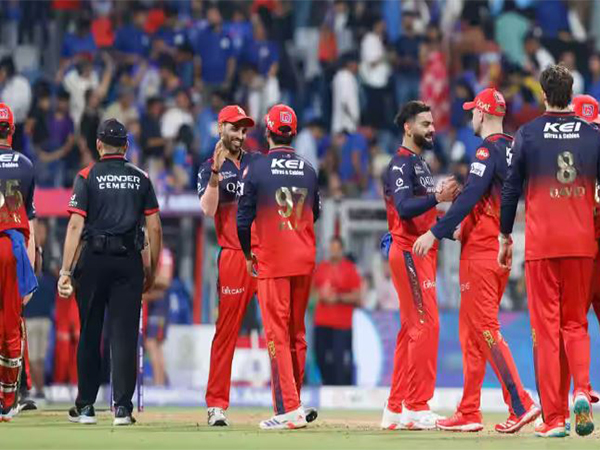Pakistan SC turns down govt's request for full court on pleas against military trials of civilians
Jul 18, 2023

Islamabad [Pakistan], July 18 : Pakistan Supreme Court on Tuesday rejected the federal government's request to constitute a full court bench to hear a set of pleas challenging the trial of civilians in the country's military courts, Pakistan-based Dawn reported.
The Supreme Court's decision came after a six-judge larger bench, headed by Chief Justice of Pakistan (CJP) Umar Ata Bandial and consisting Justice Ijazul Ahsan, Justice Munib Akhtar, Justice Yahya Afridi, Justice Sayyed Mazahar Ali Akbar Naqvi and Justice Ayesha A Malik, resumed the case.
CJP Bandial told Attorney General for Pakistan (AGP) Mansoor Usman Awan, "Judges are not available at this time. It is not possible to form a full court," according to Dawn. On Monday, the Pakistan government said that the trial of those accused of violence against the armed forces under the Pakistan Army Act (PAA) 1952 was an “apt and proportionate response” under the constitutional framework and statutory regime.
The Pakistan government requested the court to dismiss all the petitions and added that under the Article 245 of the Constitution, the armed forces have been charged with the obligation to defend Pakistan against external aggression or threat of war, as per the Dawn report.
It said, "Therefore, to create deterrence in respect of such attacks, our constitutional framework allows perpetrators of such vandalism and violence to be tried under PAA." It also pleaded that the case be heard by the full court comprising all judges and reminded that one of the members of the bench, namely Justice Yahya Afridi, in his note urged the Chief Justice of Pakistan to consider referring the matter to the full court.
At the outset of the hearing, Supreme Court Bar Association (SCBA) President Abid Zuberi noted that the apex court in the Liaqat Hussain case had decided that civilians could not be tried in military courts. He cited the judgement by ex-CJP Justice Ajmal Mian and said that only military personnel could be tried under army laws.
“The main point is, how will the suspects be connected with the crime in question,” he said as per Dawn report. Abid Zuberi said that there were previous verdicts in this regard and courts had ruled that suspects could only be tried if they were directly related to the crime.
“You are saying that a suspects’ link with the crime is the first requirement of the trial,” CJP Bandial said. He said, “According to you, civilians can be tried in military courts only after they are directly linked to the crime and after constitutional amendment."
Meanwhile, Justice Ahsan noted that Liaqat Hussain case was tried without introducing a constitutional amendment. He even asked if a constitutional amendment was required if it concerned the army's internal matters. In response, Zuberi said, "In the current situation, a trial is only possible through a constitutional amendment," Dawn reported.
During the hearing, he stressed that the extent of prosecution by military trials was not known. He added that the trials were carried out by the members of the executive and not the judiciary. Meanwhile, CJP Bandial said that the ruling in the Liaqat Hussain case stated that the military authorities could carry out investigation but not hold trials of civilians.
Justice Ahsan then asked who would decide when the Army Act could be applied and when not. Zuberi said that the police were responsible for carrying out the investigation and would decide as he ended his arguments, the report said. AGP Awan made the arguments and said that the petitioner’s counsels had spoken about the 21st Amendment, the Liaqat Hussain and Brigadier FB Ali cases.
He pointed out that a full court had decided the petitions against the 21st Amendment and stressed that a similar process should be taken up in this case. During the hearing, the court rejected the government’s request for constituting a full court bench and the hearing was adjourned till tomorrow. Former CJP Jawwad S Khawaja, Aitzaz Ahsan, Karamat Ali, and PTI Chairman Imran Khan have filed the petitions.
Earlier, Pakistan's federal government in a statement said, the military trial of civilians, who are accused of attacking sensitive installations in courts, are "apt and proportionate response" to the events of the May 9 incident.
In the statement, which is submitted to the court, the central government said, "The trial of those accused of violence against the armed forces, as well as personnel and establishments thereof, under the Amry Act, is an apt and proportionate response, in accordance with the existing (and prevalent) constitutional framework and statutory regime of Pakistan."
The Pakistan federal government said that the events of May 9 were “neither localised nor isolated” and indicated a “premeditated and intentional attempt to undermine the country’s armed forces and inhibit the country’s internal security”.
As per the Dawn report, the federal government also stated that the attackers had damaged the government's properties worth Pakistani Rupees (PKR) 2,539.19 million, including Rs 1,982.95 million in losses to military establishments, equipment and vehicles.


















